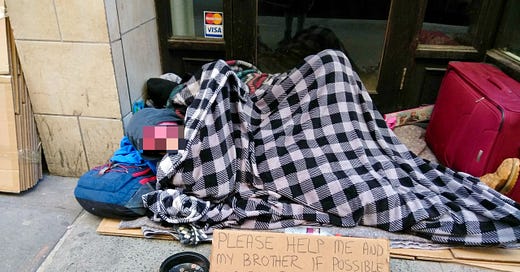#340: Bless Yourself With This One Weird Trick!
Rashi on Parashat Nitzavim-Vayeileikh, Devarim/Deuteronomy 29:18
A homeless man in New York City. Photo credit: Adjoajo, CCA-SA 4.0
Gimme Some Torah #340
Welcome new subscriber Rhonda!
וְהָיָ֡ה בְּשׇׁמְעוֹ֩ אֶת־דִּבְרֵ֨י הָאָלָ֜ה הַזֹּ֗את וְהִתְבָּרֵ֨ךְ בִּלְבָב֤וֹ לֵאמֹר֙ שָׁל֣וֹם יִֽהְיֶה־לִּ֔י כִּ֛י בִּשְׁרִר֥וּת לִבִּ֖י אֵלֵ֑ךְ לְמַ֛עַן סְפ֥וֹת הָרָוָ֖ה אֶת־הַצְּמֵאָֽה׃
When hearing the words…
Keep reading with a 7-day free trial
Subscribe to Gimme Some Torah to keep reading this post and get 7 days of free access to the full post archives.




